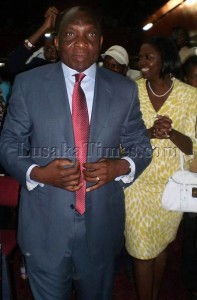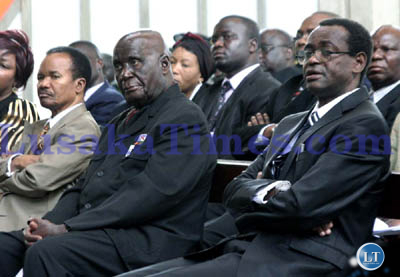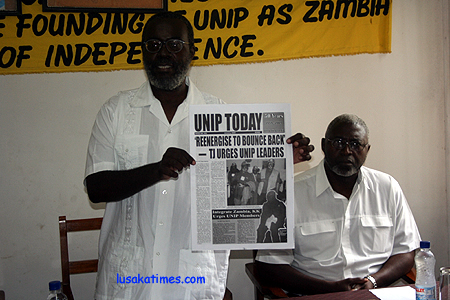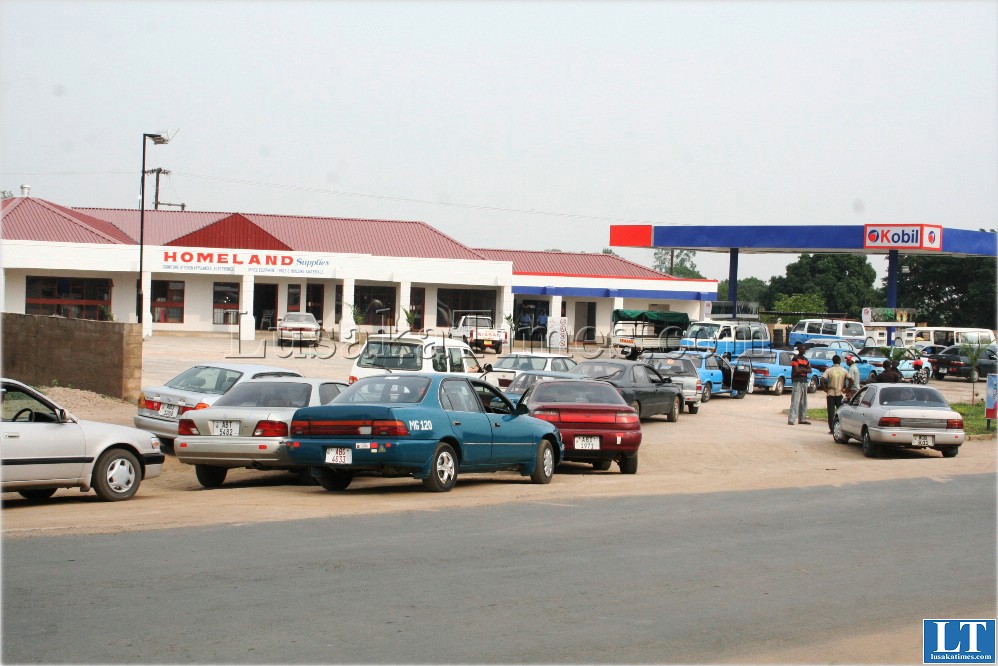By Dr Charles Ngoma
“…DECLARE the Republic a Christian nation while upholding the right of every person to enjoy that person’s freedom of conscience or religion” thus begins the pre-amble to the 1996 Zambia Constitution.
I have spoken to many people who are in favour of this declaration and have learnt several reasons. The most interesting reason had to do with what happened in the last few years before Dr Kenneth Kaunda’s government was replaced. It was the ‘Heaven on earth’ eastern mysticism that had engulfed State House that worried so many Zambian Christians. They feared that if such ‘free experimentation’ with spiritual powers at the heart of government, was allowed, who knows what the tenant at plot 1 may one day do to our beloved country?
Can a nation be Christian without such a declaration? There is no nation on earth that has declared through its constitution, albeit the preamble, that it is a Christian nation!
However, there are many that consider themselves Christian, chief among them is the United Kingdom of Great Britain and Northern Ireland, whose head of State is ‘Defender of the Faith.’ I learned that this title was once given to one Chancellor of Germany, Adolf Hitler, by the Pope!
The United States, land of the brave and free, declares that ‘all men are created equal before God’ but for 3 centuries continued to deny that equality to many of its citizens! In the minds of the founding fathers, the Christian God may have been meant, but that does not amount to a declaration that the USA is a Christian country. It does not matter whether the green buck is emblazoned with ‘In God we trust.’ Which god?
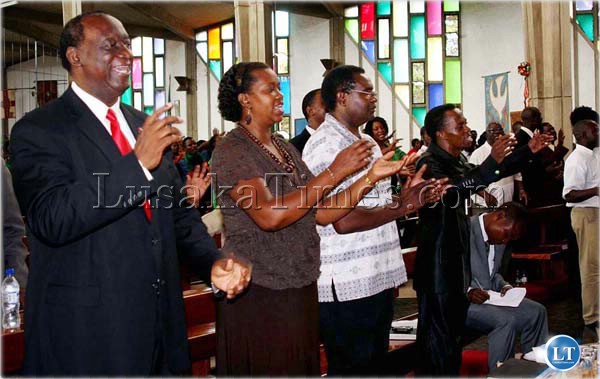
Islamic republics dotted about the world also claim to rely on ‘God’s law’ according the Islamic faith. What actually constitutes Sharia law is debatable. I believe that when one states something, and in an important document such as the constitution, their meaning must be very clear to everyone.
Putting aside the various definitions of ‘Christianity’ no one can disagree as to what the effect or results of Christianity should be. A friend of mine once told a story of a postman delivering mail to a house in Britain, where a vicious looking dog lived. Seeing the dog, the Post man tried to deliver the post as quietly and as quickly as he could. As he tip-toed towards the house, the owner of the house saw him. Sensing the Postman’s dread, the owner shouted to him, ‘Don’t worry, he is a good Christian!’ That sums it up I think. Christianity is expected to be harmless.
Whatever you call it, I am happy to be part of a nation that fulfils these four principles:
1. Recognises that all men are created equal before God.
Here is the fundamental basis for the rule of law. If we all accepted this, there would be no corrupting of officials in order to gain an upper hand over someone else. I we all recognised this, we would not be too proud to think that we are better than another, but would be humbled to accept that what we have is a gift from God and its purpose is to supplement what lacks in another member of the society. The first recorded question that man ever asked God is, ‘Am I my brother’s keeper?’ It is that question that Jesus answered when He said, ‘Do to others as you would have them do to you.’ In an imperfect world, this is a hard saying. We all want others to do to us better than we would do to them. I want to drive the best car in the hood. I want the best for myself. Once the comparative adjective is used, someone else will fare worse. The best we can do without supernatural help cannot match up to the standard that calls upon us to ‘love others as we love ourselves!’ This would mean that ‘myself’ would be the poorest person, ‘myself’ would be the hungriest, the most poorly dressed, most poorly housed! The duty of a Christian state would be to level the playing (or fighting) field so that no one has undue and unfair advantage over another!
2. Maintains the sanctity of life.
Human life should not be taken unadvisedly and thoughtlessly. It does not matter how ‘despicable’ one is in another’s eyes, as long as they are human, they should be valued and respected. Laws that allow for the taking of one’s life before and after birth are wrong and un-Christian. Ah, but some will say, what about in the Bible? Weren’t people executed for their sins in the Bible? The answer to that is simple. Israel was a Theocracy and only the One who created life has the right and authority to take it. The executioner was endowed with the wisdom and knowledge of justice, so that there was no miscarriage of justice. However, even in those severe situations, there was the exercise of mercy and the stay of execution!
3. Provides for the poor.
This is a hot potato. There are many self appointed advocates for the poor. I find the Roman Catholic priests like Father Bwalya in Kitwe contradicting themselves here. On one hand, the Church extols those who have vowed the vow of poverty and has beatified their founder; while on the other hand, they blame the state for ‘rising levels of poverty.’ Captain Solo was quoted as saying that the kingdom of heaven belongs to the poor. If that were the case, we would all be fighting a good thing by trying to get rid of poverty, a means to inheriting the kingdom of God! No, friends, it is the ‘poor IN SPIRIT’ who are blessed, not the poor in material wealth!
Let me try and explain this by using the Biblical Greek words that are translated ‘poor’ in English. Now, that is of utmost importance for us to understand. There is no ‘blessedness’ in poverty. Jesus never said that the poor will inherit the earth! God never ever said that poverty is good for anyone. Indeed, the Jewish people recognised that poverty is an evil intrusion in the life of a person. God wants all men to prosper. The two words that are translated poor mean two different kinds of people. First, there is poverty that relates to ‘low income’ by virtue of the lowly means of livelihood. This kind of ‘poor’ is recognised in the Bible but no one should have pity on a person like this as long as this person is able bodied. Why? It is because given time, ingenuity and opportunity; such an one can rise to be the richest person on earth! Indeed, history is replete with ‘from rags to riches’ stories! However, there is another kind of ‘poor’ of whom Jesus said, ‘will always be with you.’ These are the disadvantaged in our society by reason of infirmity. These can never alter their fortunes without the help and assistance of us all. These are the blind folk we see in our streets, being led forth by a child who will never go to school! These are the weak in body who cannot till the land. All of us whether as individuals or corporately through the State and NGOs have a responsibility towards these people. Let me state here that it is not the responsibility of the State to ‘create employment.’ This is the one fallacy from communism that has continued to simmer through western liberal economics! The Capitalist state does not own the means of production so how can it provide 100% employment?
The State must lay down laws and conditions for the creation of wealth and it is wealth so created that provides employment for the people. What do people mean when they say ‘un-employment is going up?’ What do people mean when they say, ‘poverty levels are unprecedented?’ We tend to borrow terms from other people without really defining what we mean! Indeed what do we mean by ‘development?’ I put it to us all that we will be developed when every child born in Zambia has the highest chance of reaching 120 years of age, when every pregnant woman has a 100% chance of giving birth to a healthy baby, when every child born in Zambia will grow into adulthood and have a means of livelihood ! We will be developed when every person in Zambia can balance calorific intake with body metabolic output .
4. Protects human rights and property and encourages personal responsibility.
The Christian state must ensure that there is adequate security for the protection of individual rights and property. Human rights obviously include responsibilities. We cannot talk about rights without the other. As for the protection of property whether public or private we all have responsibility. To see our most educated children running amok and maliciously vandalising public and private property is shameful. Naturally, theft and plunder of national resources should be condemned and culprits found and punished appropriately when found guilty. It is the duty of the State to enact laws and regulations that will be most effective in bringing this about.
If these things are in our country and abound, we will live in peace as a nation. Indeed if this was so, I would be quiet happy to accept that Zambia is a Christian country, and to me it will not matter whether the President was Buddhist, Hindu, Moslem or atheist or whether it is declared or not! My Bible says that I should pray for those who are in authority so that we live in shalom conditions.


